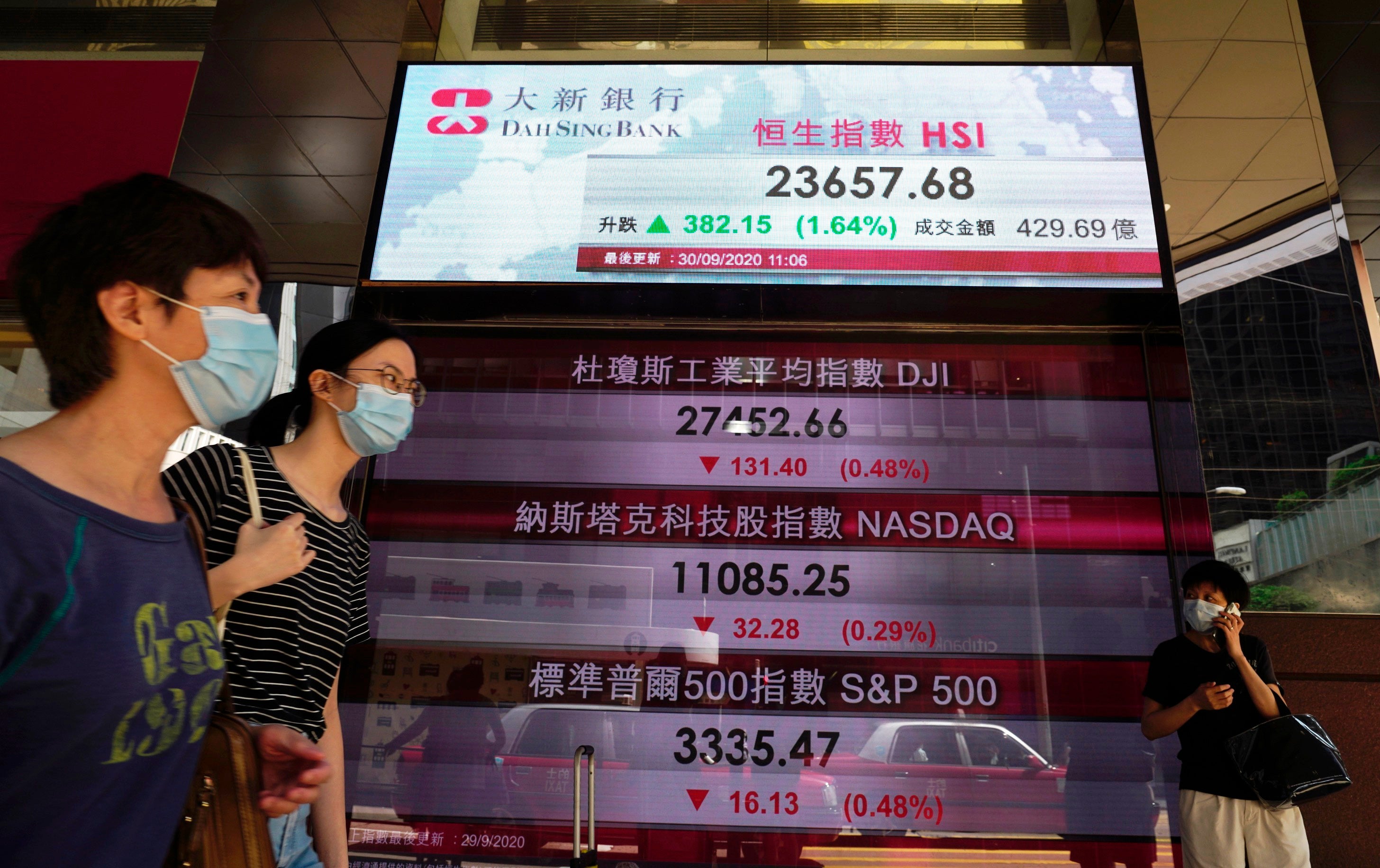Markets mixed after Trump-Biden debate; data lifts China
Stocks are mixed in Asia after the debate between President Donald Trump and his Democratic challenger Joe Biden, with little sign the clash did much to sway investors

Your support helps us to tell the story
From reproductive rights to climate change to Big Tech, The Independent is on the ground when the story is developing. Whether it's investigating the financials of Elon Musk's pro-Trump PAC or producing our latest documentary, 'The A Word', which shines a light on the American women fighting for reproductive rights, we know how important it is to parse out the facts from the messaging.
At such a critical moment in US history, we need reporters on the ground. Your donation allows us to keep sending journalists to speak to both sides of the story.
The Independent is trusted by Americans across the entire political spectrum. And unlike many other quality news outlets, we choose not to lock Americans out of our reporting and analysis with paywalls. We believe quality journalism should be available to everyone, paid for by those who can afford it.
Your support makes all the difference.Stocks were mixed in Asia on Wednesday after the debate between President Donald Trump and his Democratic challenger Joe Biden with little sign the clash did much to sway investors
Hong Kong and Shanghai led regional gains while Japan’s Nikkei 225 declined. Overnight, the S&P 500 lost 0.5% as heavy selling of banks helped reverse some of the gains the market a day earlier.
Investors remain cautious with COVID-19 infections on the rise again in the U.S. and elsewhere. The Trump-Biden debate occurred as coronavirus deaths worldwide have surpassed 1 million. Many millions of people worldwide are jobless.
A survey of Chinese manufacturers, t he Caixin manufacturing purchasing manager's index, showed economic activity accelerating further in September as businesses recovered from the downturn earlier this year due to the pandemic.
The Caixin manufacturing PMI slipped to 53.0 from 53.1 in August, on a 100-point scale. China's official manufacturing PMI rose to 51.5 from 51.0, its highest level in two years.
“The economic recovery has picked up pace with supply and both domestic as well as overseas demand improving," Stephen Innes of AxiCorp said in a commentary.
The Hang Seng in Hong Kong jumped 1.4% to 23,593.51, but fell back from a 2.1% gain earlier in the morning. The Shanghai Composite index surged 0.6% to 3,243.79.
Japan’s Nikkei 225 index lost 1.2% to 23,269.19, while the S&P/ASX 200 skidded 2.0% to 5,835.70. Markets were closed in South Korea.
Shares fell in Thailand and Indonesia but rose in Taiwan and Singapore.
U.S. futures were lower, with the contract for the S&P 500 down 0.6% while the contract for the Dow industrials fell 0.7%.
Overnight, stocks ended with moderate losses Tuesday as investors waited for the first debate between Trump and Biden.
The debate's likely impact on markets if any, was unclear. The atmosphere was antagonistic, as to be expected, but for voters still undecided about who’d better handle the multiple crises that have beset the nation, the faceoff may not have offered anything new.
“Markets have remained calm as no policy surprises have emerged from the debate so far," Jeffrey Halley of Oanda wrote in a report.
“My initial thoughts are the debate will not move the needle on the Democrat lead in the national polls," he said. “The real race this election, is for the U.S. Senate, and not the presidency, and whether the Republicans can block a Biden economic agenda, or whether the Democrats have a clear road ahead via control of both houses and the presidency."
On Wall Street, banks, energy companies and stocks that depend on consumer spending had some of the biggest losses.
The price of oil fell 3.2% on Tuesday, dragging much of the energy sector down with it. On Wednesday, U.S. crude fell 40 cents to $38.89 per barrel in electronic trading on the New York Mercantile Exchange. Brent crude, the international standard, gave up 47 cents to $41.09 per barrel.
Uncertainty over the course of the pandemic and over how it will affect the economy has clouded sentiment, with the benchmark S&P 500 on track to fall 4.7% this month, its worst month since March when the stock market plunged sharply as outbreaks spread in the U.S.
“The market needs the economy to remain open,” said Mark Hackett, chief of investment research at Nationwide. “We can handle bumpy economic data, but markets are not priced for the economy to shut back down.”
The S&P 500 index fell 16.13 points to 3,335.47, after rallying the day before. The Dow Jones Industrial Average 0.5%, to 27,452.66, and the technology-heavy Nasdaq composite lost 0.3%, to 11,085.25.
Congress still is arguing over the size of a new economic support package after additional unemployment benefits expired. House Speaker Nancy Pelosi and Treasury Secretary Steven Mnuchin have agreed to hold another round of stimulus talks. However with the death of Supreme Court Justice Ruth Bader Ginsburg, Congress has redirected much of its attention to President Trump's nominee to replace her.
The last major jobs report before the election will come out on Friday. It is a key indicator or how businesses are faring but also politically important for both GOP and Democratic messaging heading into the election. Economists expect 850,000 jobs were created in September, with an unemployment rate of 8.2%.
In currency dealings, the U.S. dollar weakened to 105.52 Japanese yen from 105.64 yen late Tuesday. The euro fell to $1.1732 from $1.1744.